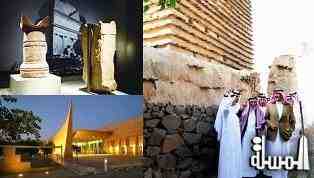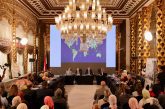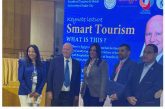
SCTA s consecutive achievements in the preservation and development of National Heritage
Crowned by Cabinet approval for "King Abdullah Cultural Heritage Care Project" SCTA’s consecutive accomplishments in preservation and development of the National Heritage
Almasalla Arab Travel Portal News – The recent resolutions of the Council of Ministers on last Monday, 13th Jan, on "King Abdullah Cultural Heritage Care Project", has crowned the great efforts exerted by SCTA, which is aimed to create quantum leap in the course of caring of antiquities and museums in the Kingdom since it has taken the responsibility on this sector in 2007 until reaching this project which includes a set of programs and projects aimed at raising awareness on preservation and rehabilitation of the national heritage and attracting the efforts of government agencies and citizens for the implementation of this project.
SCTA has worked to create a quantum leap in antiquities and museums sector since 27th December, 2007 the day it assumed responsibility on this sector. Since then it has been working in collaboration with a number of relevant public departments in addition to a selected national intellectuals and thinkers to set up a clear vision for caring of the antiquities and the urban heritage of the Kingdom of Saudi Arabia.
An executive plan was set to develop the sector in accordance with the directives of the wise leadership of the country regarding the preservation of the antiquities and protect them from encroachments and misuse. The executive plan also aimed at documenting and rehabilitating the antiquities and urban heritage sites as well as exploiting them culturally and economically. It also aimed at recovering the national antiquities that have been possessed illegally by some people whether inside or outside the Kingdom, and to seek registration of archeological sites in World Heritage Site, highlight the cultural dimension of the Kingdom in order to be attached to its other religious, political and economic well-known dimensions, in addition to expanding establishment of museums across the provinces and municipalities of the Kingdom.
28 Saudi and international missions work in archeological sites:
SCTA is executing a major antiquities excavation and survey program across different parts of the Kingdom in which are taking part a number of Saudi scientific teams or carried out jointly with other international teams. There are 28 Saudi and international joint missions working on archeological sites, including international archeological teams from France, Italy, USA, Britain, Germany, Japan, and Belgium.
SCTA attaches special importance to archeological excavation, especially that the Kingdom is rich of thousands of archeological sites which form a cultural treasure of great historic importance.
The body has begun expansion in survey and excavation processes since it became responsible of the antiquities and museums sector. Study of those sites showed very important results about the history and culture of the Arabian Peninsula. Accordingly, thousands of new sites have been surveyed and registered throughout the Kingdom covering all stages and historic periods in the Arabian Peninsula. The Antiquities National Registry has been founded and in which all the archeological sites and antiquities were registered.
The Islamic history sites have enjoyed great attention by SCTA which had put into effect the Royal Decree which ordered it to survey and list the Islamic history sites in both Makkah and Al Madina cities in an effort to preserve all the historic sites including mosques and protect them for being removed for any reason.
SCTA in this respect has formed a special committee to survey the Islamic history sites in both cities in coordination with a number of public departments and a group of specialists, historians and people concerned of antiquities in the two cities. The committee is mainly aimed to prepare lists of those sites. Field survey resulted in listing about 384 sites in both the cities, of which 266 in Al Madina and 118 in Makkah.
SCTA for the success of these efforts has established the program for caring of the Islamic history sites.
These efforts were crowned by launching the ‘Program of Caring of the Islamic History Sites’ which is dedicated to preserve these sites especially in Makkah and Al Madina and this program is supervised by a number of religious scholars from the Saudi Senior Scholars Authority in addition to specialists in Islamic history antiquities.
Besides survey and excavation works, SCTA works in collaboration with its partners in public sector in rehabilitation and development of 12 archeological sites across different parts of the Kingdom and opening them for the visitors.
SCTA has also taken a number of measures to protect archeological items and sites including preparing the project of the new regulation of antiquities, museums and urban heritage which was approved by the Majlis Alsh-Shura and is expected to be approved by the Council of Ministers soon. The regulation includes all necessary rules that would contribute to the preservation of the national heritage and the antiquities of the Kingdom, and enact tough penalties against encroachment cases, and to issue necessary resolutions and directives by the State for ensuring preservation of the heritage and archeological sites in addition to establishing the National Antiquities Registry which includes full information on the sites and relics in the Kingdom which will be subjected to periodic updates.
SCTA will also undertake rehabilitation of the sites that includes archeological buildings such as castles in addition to historic sites in order to develop them and transform them into tourism attracting locations. SCTA works include restoration and development of those sites, establishing visitors’ centers inside them, providing and completing service infrastructure including communication, water and road networks, in addition to signboards and creating facilities for food services.
SCTA’s concern on antiquities is reflected in organization of the exhibition, "Saudi Archeological Masterpieces through the ages" the events of which were firstly launched in Louver Museum, Paris, France before shifting to La Caixa Foundation in Spain, and Hermitage Museum in St. Petersburg, Russia, the Pergamum Museum in Berlin, Germany, the Smithsonian Institution in Washington, D.C., Carnegie Museums of Pittsburgh, USA, and currently at Fine Art Museum in Houston, Texas in the United States of America.
Recovery of 17,000 archeological items:
SCTA’s attention towards antiquities is also shown in its major campaign to recover the national antiquities nationally and internationally, as there are thousands of archeological objects possessed by citizens and expatriates inside the Kingdom, in addition to a large number of relics that have been taken illegally outside the country. SCTA is working hard to recover these relics inside or outside the Kingdom in accordance with the national and international laws and conventions. SCTA has set a special mechanism to recover the national antiquities. A special unit was formed to recover the national antiquities that were taken outside the country. Also a committee was formed upon the approval of the King to follow up the recovery process of the national antiquities.
The President of SCTA in this context had launched a special campaign for recovering the national antiquities under the patronage of the Custodian, King Abdullah bin Abdul Aziz Al Saud, as the Custodian had declared his personal patronage of the exhibition of recovered national antiquities which was held in conjunction with the events of Al Jenadriyah Heritage and Cultural Festival in 2012.
SCTA’s efforts have yielded in the recovery of over 17000 relics, 14000 of which from outside the Kingdom, and some of them were missing for 50 years.
Archeological and Heritage Sites registered in World Heritage List:
SCTA has paid great attention to register Saudi archeological and heritage sites in the UNESCO’s World Heritage List in an effort to preserve and highlight the rich and divers heritage of the Kingdom of Saudi Arabia. Registration process began after the Council of Ministers had made its approval for registration of Al Daryia Historic Area, Madain Saleh and Jeddah Historical Area in 2006.
Madain Saleh was registered in the World Heritage List as the first ever Saudi archeological sites to join the international list in 2008, followed by the registration of Turaif Quarter in Al Daryia Historic Area in 2010, while the efforts are underway for preparing the Jeddah Historic Area file for registration in the World Heritage List.
Also King Abdullah has given his approval for the registration of rock art sites at Jeba and Al Shewaimis in the Hail Province in the World Heritage List. SCTA is currently working on preparation of the file of these sites in collaboration with an expert team form the World Heritage Center.
Great attention towards museums:
Besides antiquities, SCTA has paid great attention to the museums and linking them with tourism activities as currently it is responsible for 29 museums spread throughout different provinces of the Kingdom. It is also currently undertaking the establishment of 5 regional museums in Al Dama, Al Baha, Abha, Hail and Tabuk. Also work is underway in the development and upgrading of 6 existing museums in Tem’a, Najran, Jazan, Al Ahsa, Al Ula, and Al Jouf. The work includes development of museum buildings and museums’ showcasing techniques.
Besides establishing new museums and developing existing ones, SCTA is working on the employment of some heritage and historic buildings that have been restored as museums across municipalities and these are 15 museums.
SCTA in collaboration with the Riyadh governorate and Al Kharj municipality, and Ar-Riyadh Development Authority (ADA), is preparing for a study to rehabilitate King Abdul Aziz Palace and its surrounding area in Al Kharj, and transforming it into a historical center named after King Abdul Aziz. The project includes establishing a museum for Al Kharj municipality inside the King Abdul Aziz Palace.
SCTA on the other hand works for supporting museum culture and experience exchange, and in this field, and in the framework of its cooperation with the National Museum and a number of other museums, it has organized a number of antiquities exhibitions in "visiting exhibitions hall" in the National Museum. SCTA’s plan in this respect includes organization of a number of exhibitions in the National Museum during the next few years with an average of four exhibitions a year.
Rehabilitation and development projects of the urban heritage
The efforts of SCTA for taking care of the urban heritage is based on a number of themes under the support of the State and through a number of regulations and decrees aiming to prevent encroachment and removal of these sites. SCTA through the Urban Heritage National Center works to preserve the urban heritage buildings through restoration and maintenance of these sites and employ them in different areas. It also works for preventing removal and demolition of these sites based on a number of circulars and laws issued by the State. Also its efforts in this respect are based on a number of programs designed to address urban heritage developmental issues as well as urban heritage sites preservation, registration and classification. There are about 1985 urban heritage sites that have been surveyed and listed including heritage quarters and villages, historic centers, and urban heritage monuments and buildings.
Besides the efforts of rehabilitation and development of urban heritage sites, architecturally, culturally and economically, SCTA also undertakes raising awareness on the importance of the national cultural asset, in addition to transform them into an economic resource for the benefit of local communities and as a source of employment, besides urging the public and private sectors to finance and invest into this sector.
SCTA has also launched a number of programs and projects in this respect including the Heritage Villages Development Fund project, Urban Heritage Funding project via the Saudi Credit and Saving Bank, and the project of establishment of Heritage Hotel Company.
In the field of training and promoting capabilities of the national cadres in the urban heritage, SCTA has been providing unlimited technical support to the urban heritage sector, where it has established a special unit to supervise and follow up the execution of SCTA’s projects in the urban heritage.
SCTA also organized a number of overseas trips to explore international expertise in the field of urban heritage development and preservation, and entered into partnership with the public authorities, and a number of relevant ministries, to executive joint tasks in the field of development and preservation of urban heritage.
SCTA undertakes the development of City historic centers in collaboration with the Ministry of Municipal and Rural Affairs in addition to relevant public and private authorities with a focus on the centers that include urban heritage buildings and that include distinguished ancient architectural elements. City centers projects include development and rehabilitation of Al Daryia Historic Area, Jeddah Historic Area, Jazan City center, Tabuk City center.
SCTA is also undertaking rehabilitation of urban heritage areas along the seaports of the Red Sea, and this project in its first phase focuses on the development and rehabilitation of historic centers of Yanbu, Amlaj, Al Wajh and Deba.
SCTA’s attention on Handicrafts:
SCTA also has paid great attention to handicraft, and it had a significant contribution to the approval of the National Strategy for Development of Handicraft and its five-year executive plan by the Council of Ministers recently. The approval reflects State’s attention towards the development of this important sector which promises of many economic benefits as well as providing a source of income to a wider sector of people across different parts of the Kingdom of Saudi Arabia. The approval has crowned the government’s previous resolutions which aimed at the development of such an important economic sector, the most important resolutions in this respect were the Royal Decree which instructed that State official gifts to State guests should be given from the national handicraft and handmade industries.
SCTA also paid great attention to the associations and festivals that are contributing to the preservation and highlighting of the national heritage, such as Al Jenadriyah Heritage and Cultural Festival which embodies the vision of the Custodian of the Two Holy Mosques King Abdullah bin Abdul Aziz and reflects the special attention he pays to the national heritage.
Handicraft and handmade industries market in the Kingdom exceeded SR 2 billion annually, and it employs over 20,000 artisans who practice various crafts.
The most important efforts made by SCTA in support of this sector are the organization of training courses and programs for the artisans to promote the quality of their products. SCTA, so far has conducted about 153 training programs that were attended by 2400 persons who wished to develop their skills in the field of handicrafts from different parts of the Kingdom. It has also organized a number of successful exploration trips internationally in order to explore the world experience in the field of handicraft and handmade industries, some of these trips were made to the Kingdom of Morocco and the Republic of Ireland.
SCTA also provided marketing outlets for artisans to sale their products inside a number of commercial complexes and shopping malls, in addition to its cooperation with the Saudi Post for selling handicraft products online through its e-Mall portal.








